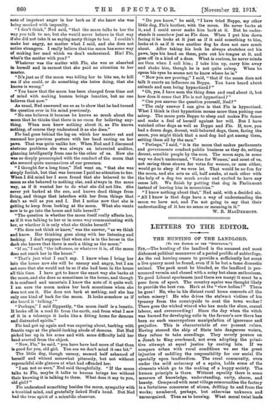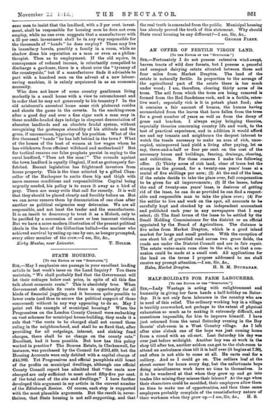LETTERS TO THE EDITOR.
THE HUNTING- OF THE LANDLORD.
• [To THE EDITOR OF THE "SPECTATOR.'] SIR,—The hunting of the landlord is the meanest and most dishonest political manceuvre of a period prolific of subterfuge. As the red herring ceases to provide a sufficiently hot scent a live quarry must be found, even if it be but a tame domestic animal. The pack must be blooded, so the landlord is pro- nounced vermin and chased with a noisy but sham enthusiasm. To good Liberal sportsmen (and there are many) it must be a poor form of sport. The country squire was thought likely to provide the best run. Hark at the "view holloa!" There he goes ! He, who in his distant rural home concocts all the urban misery! He who drives the stalwart victims of his tyranny from the countryside to oust the town worker ! There goes the wicked wizard who has made the slum, casual labour, and overcrowding ! Since the day when the witch was burned for developing colic in the farmer's cow there has been no such unscrupulous manipulation of ignorance and prejudice. This is characteristic of our present rulers. Having steered the ship of State into dangerous waters, they refuse to take soundings. They merely pounce on a Jonah to fling overboard, not even adopting the primi- tive attempt at equal justice by casting lots. If we compare urban with rural conditions we see the great injustice of saddling the responsibility for our social ills specially upon landlordism. The rural community, even under the mild autocracy of a squire, holds some of the elements which go to the trial lug of a happy society. The human principle is there. Without equality there is some measure of knowledge, understanding, unity, charm, and • beauty. Compared with most village communities the factory is a fortuitous concourse of atoms, drifting to and from the works; numbered, perhaps, but otherwise unknown and unrecognized. Then as to housing. What moral twist leads
sane men to insist that the landlord, with a 3 per cent, invest- ment, shall be responsible for housing men he does not even employ, while no one even suggests that a manufacturer with a 25 per cent. investment shall be in any way responsible for the thousands of " hands " he does employ ? These may live in insanitary hovels, possibly a family in a room, while no shadow dims his reputation as a man or even as a philan- thropist. Then as to employment. If the old squire, in consequence of reduced income, is reluctantly compelled to discharge a gardener, there is a shout over the "tyranny of the countryside," but if a manufacturer finds it advisable to part with a hundred men on the advent of a new labour- saving machine, it is calmly acquiesced in as an economic necessity.
Who does not know of some country gentleman living modestly in a small house with a view to retrenchment and in order that be may act generously to his tenantry ? In the old aristocrat's ancestral home some rich plutocrat resides and shoots the game in the coverts. In the smoking-room after a good day and over a fine cigar such a man may in these muddle-headed days indulge in eloquent denunciation of absentee landlords and an obsolete feudal system, without recognizing the grotesque absurdity of his attitude and the gross, if unconscious, hypocrisy of his position. What of the five thousand " hands " he has left behind in the town ? What of the homes of the host of women at low wages whom he has withdrawn from efficient wifehood and motherhood ? But for tactical reasons our false prophets persist in saying to the rural landlord, "Thou art the man!" The crusade against the town landlord is equally illogical, if not so grotesquely far- fetched. Recent legislation has frightened investors from house property. This is the time selected by a gifted Chan- cellor of the Exchequer to smite them hip and thigh with more onerous conditions and responsibilities. Capital being urgently needed, his policy is to scare it away as a bird of prey. There are many evils that call for remedy. It is well that they should be placed clearly and forcibly before us. But we can never remove them by denunciation of one class after another as political exigencies may determine. We are all responsible, and not least the trader and the manufacturer. It is an insult to democracy to treat it as a Moloch, only to be pacified by a succession of more or less innocent victims. But we have a more modern illustration of the present political ideals in the hero of the Gilbertian ballad—the mariner who achieved survival by eating up one by one, as hunger prompted, every other member of the crew.—I am, Sir, &c., Kirby Muxioe, near Leicester. T. Holm's.



















































 Previous page
Previous page